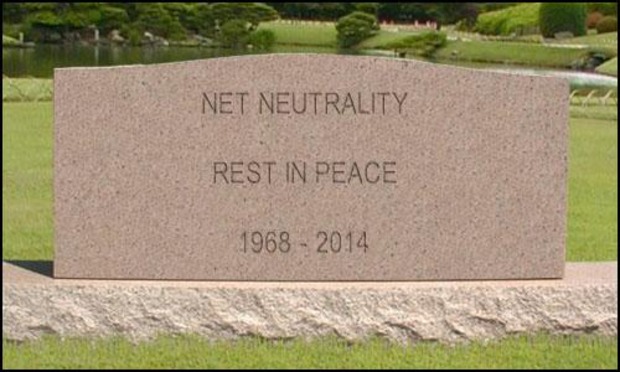 Say goodbye to net neutrality. Three months after a federal appeals court struck down the agency rules intended to guarantee a neutral Internet, the F.C.C. has shifted its position on the matter, now supporting “fast lanes” for Internet traffic. That means that companies like Comcast, Verizon, and Time Warner can charge higher rates for faster services.
Say goodbye to net neutrality. Three months after a federal appeals court struck down the agency rules intended to guarantee a neutral Internet, the F.C.C. has shifted its position on the matter, now supporting “fast lanes” for Internet traffic. That means that companies like Comcast, Verizon, and Time Warner can charge higher rates for faster services.
From our end, this doesn’t look very good. For one thing, as Delara Derkhshani, policy counsel for Consumers Union points out: “It leaves consumers at the mercy of a handful of cable and phone providers that can give preferential treatment to the content they profit from.” Cable companies, of course, deny that these kinds of practices will occur. But when a company like Comcast, which owns NBC Universal Studios, stands to profit from giving their own companies an online advantage the temptation may be too great to ignore. For another, this means our website, and yours, is likely to load a lot more slowly in the future. As Tim Wu explains in the New Yorker:
The new rule gives broadband providers what they’ve wanted for about a decade now: the right to speed up some traffic and degrade others. (With broadband, there is no such thing as accelerating some traffic without degrading other traffic.) We take it for granted that bloggers, start-ups, or nonprofits on an open Internet reach their audiences roughly the same way as everyone else. Now they won’t. They’ll be behind in the queue, watching as companies that can pay tolls to the cable companies speed ahead.
Wu speculates that the reason to do this isn’t more complicated than carriers wanting to make more money for doing what they already do. We agree—and let’s not forget that they’re not very good at that. Even Comcast recently conceded that they “have trouble delivering real high-quality service on a consistent basis.” It’s surprising to see this is an issue though, given the amount of resources at their disposal augmented in no small part by tax breaks. That much was laid out by Daniel Denver in today’s Times op-ed, which outlines the money Comcast has spent lobbying politicians for preferential treatment. According to Citizens for Tax Justice, Comcast paid an average state corporate income tax of 4 percent between 2008 and 2012. The new Comcast center received $42.75 million in state tax breaks.
As for other press coverage on the matter, the Wall Street Journal’s reportage has been cautiously, but predictably friendly to the telecom companies; their interests are vaguely described as “a desire to explore new business models in a fast-changing marketplace.” They go on to say that the F.C.C. plan is a “middle ground.” In a separate report over at the Times, the F.C.C. Chairman Tom Wheeler tried to quell fears that this was the end of net neutrality. “The new rules will provide for net neutrality along the lines of the appeals court’s decision,” he said. He did not mention that the F.C.C.’s net neutrality rules had been been struck down by the courts.


Comments on this entry are closed.